- Title: Anna Karenina
- IMDB: link

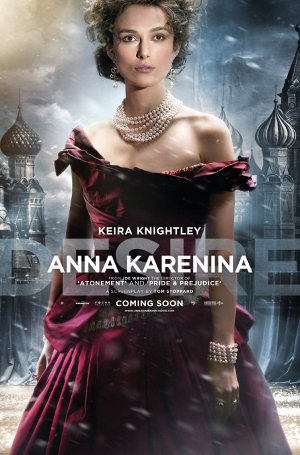 Attempting another historical adaptation of classic literature, while re-teaming with leading lady Keira Knightley (with whom he collaborated on both Pride & Prejudice and Atonement), director Joe Wright delivers the unexpected with an evocative and dazzling adaptation of Leo Tolstoy‘s legendary novel Anna Karenina.
Attempting another historical adaptation of classic literature, while re-teaming with leading lady Keira Knightley (with whom he collaborated on both Pride & Prejudice and Atonement), director Joe Wright delivers the unexpected with an evocative and dazzling adaptation of Leo Tolstoy‘s legendary novel Anna Karenina.
Limited by budgetary considerations and an unwillingness to repurpose locations other adaptations of Tolstoy’s work, or those used by various recent historical dramas, Wright hit upon an extraordinary idea to breathe new life in the staid genre by staging a setting that transforms around its characters. The result is a game changer in how movies like Anna Karenina are told and a serious contender for the best film of 2012.
Set in Russia during the late 19th Century our story concerns rich socialite Anna Karenina (Knightley), her marriage to an honorable but bland government official (Jude Law), and her temptation and eventual affair with the far more dashing Count Vronsky (Aaron Taylor-Johnson).
Knightley is terrific here in the center of a storm as her character’s contentedness is shattered by her longings for Vronsky. Although I will admit I was occasionally distracted by Helena Bonham Carter-inspired frizzy hair which mirrors the character’s loss of control in several crucial scenes in her and her eventual descent into despair and madness. The immediate joy of the affair, of course, is in turn shattered by the harsh consequences of her actions as the film’s themes of fidelity, love, societal pressures, and sexual pleasure which force Anna on a roller-coaster of emotion that Knightley expertly navigates from beginning to end. No doubt she has another Oscar nomination in her immediate future.
The film also focuses on the marital infidelities of Anna’s brother (Matthew Macfadyen, in a thoroughly enjoyable performance), and the romantic hardships of the coquettish young Kitty (Alicia Vikander) whose infatuation with Count Vronsky makes her blind to the affections of a good-hearted but shy country landowner (Domhnall Gleeson) who wishes to make the young woman his wife.
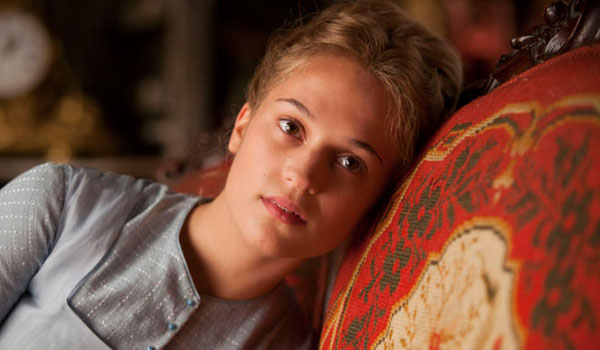
Tolstoy’s story is a tale of carnal desire and romantic love set against societal norms, strict class structure and expected behaviors, and the internal battle of following one’s desires against showing proper fidelity and faithfulness to your husband and the state. Although truly original when it was first published in the mid-1870’s, its themes of a rich woman trapped in a loveless marriage struggling to find a balance between love and happiness and the pressures of being true to her status have become commonplace in movies over the years. If Anna Karenina has any weakness, it is only in how commonplace its themes have become in movies and literature since the book’s publication more than 130 years ago. Wright, however, proves more than adept at taking what we have seen before and transforming it before our eyes doing honor to its legacy while crafting a fresh take on Tolstoy’s themes and characters.
Given the age we live in and the ever-increasing ability of CGI and new technology to change the way films are produced, the term “movie magic” does not have the same connotation it once had, but given the structure by which Wright frames the classic tale it is apt here. Anna Karenina is set mostly in an old theater which is constantly being transformed in front of our eyes through the use of backdrops, curtains, rolling set pieces, and countless extras weaving their way through the foreground and background (as if dancing to a music the audience can’t quite hear and our characters can’t quite see) to help transform each of the elaborate sets into something more than the sum of its parts.
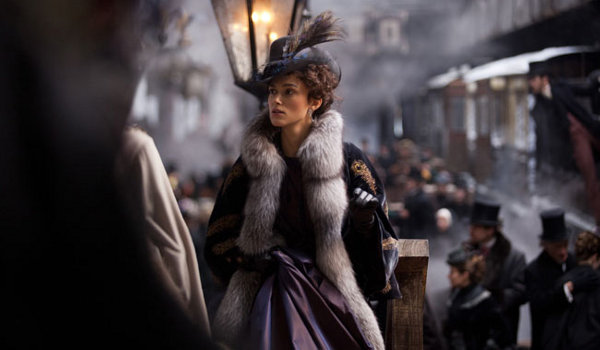
Through the use of staging, some well-placed camera tricks, and good old-fashioned know-how, production designer Sarah Greenwood crafts an amazing, and truly believable, world that enhances rather than distracts from Tolstoy’s tale. We are given palaces, street corners, ball rooms, train stations, factories, and even a horse track (all under the roof this theater) that are all blended seamlessly together with actual locations involving never-ending fields of wheat or the bitter Winter of the Russian landscape.
The levels of the theater help frame the class structure of our tale as the poor and disenfranchised, such as Levin’s brother (David Wilmot) are cast out to the attic and extreme edges of the world as organized under this roof. And the transitions! One of my favorite scenes involves an increasingly paranoid Anna pacing through her lavish dressing chambers only to sit down on a couch, reach up and pull the curtain to reveal a train window, completely re-framing the scene as she travels back home to St. Petersburg.
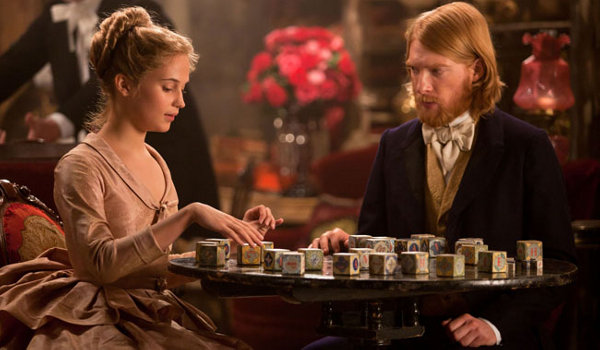
Anna Karenina uses a variety of small props to enormous success as well including the childhood train set of Anna’s son which stands in perfectly for the actual train Anna takes between Moscow and St. Petersburg. Wright also uses the childish toy of simple wood letter blocks to tremendous effect allowing the film’s least capable characters (one due to shyness and the other to shame) to admit their true heart’s desire to each other with a minimum of spoken dialogue. He even gives us a Russian Winter brought on a single torn letter thrown into the sky.
One of the biggest surprises to me was the amount of wit and humor the film has, which is in no small part thanks to the choice of screenwriter Tom Stoppard (Shakespeare in Love) to pen the adaptation. Macfayden steals several of these moments as the charming womanizer who, despite the love for his wife (Kelly Macdonald) and children, can’t stop himself from straying into other women’s beds.
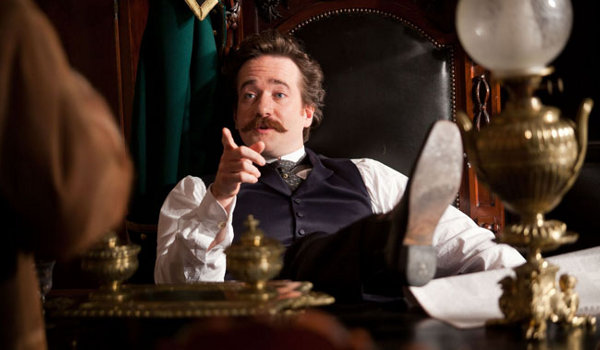
Joe Wright, his cast and crew somehow manage to mix the best of motion pictures with both the dramatic stage and street theater for a bold new interpretation of Tolstoy’s classic of love, loss, responsibility, and madness. From the perspective of different characters the film expertly demonstrates the many forms of love ranging from unbridled passion to spousal duty. To call it a treatise on love may make it sound rather stiff and unyielding, and Anna Karenina is anything but. Through expert staging, well-executed cinematography, insanely good art and costume design, and classic film techniques he recreates the 19th Century story brilliantly for a modern audience.
I feel a little sorry for movies like A Royal Affair, the recent historical drama which may well earn a Foreign Film Oscar nomination. Despite being a good movie, the far more traditional film pales in comparison to magic woven here by Wright in using the oldest novel in existence to craft something completely new in film. Don’t be put off by the film’s somewhat daunting century-and-a-half pedigree, Anna Karenina is as accessible as any film you’ll see this year yet layered enough to find new meaning and appreciation with each subsequent viewing.
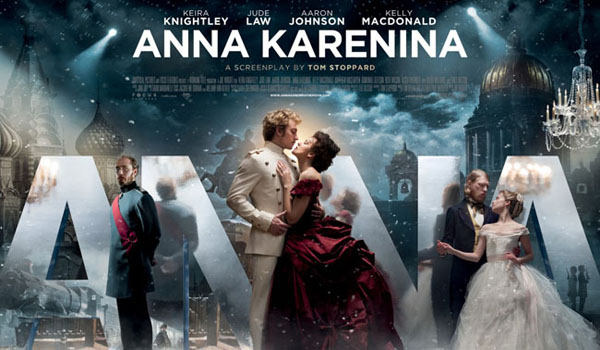

I’m going crazy. Both my wife and I have been dying to see this but it isn’t playing within 100 miles of us. We’re going to visit relatives over Christmas and I hope we can find a screening then.
Sadly neither Anna Karenina nor Silver Linings Playbook are getting the wide release they deserve. Despite opening weeks ago, and being two of the best movies of the year, both are playing in less than 500 theaters a piece. By comparison, all the top ten movies from this week’s box office are in over 2,000 screens with the top three all in more than 3,400 screens a piece.
From someone with both a film and theatre background this is an amazing movie. I don’t understand why it didn’t get more attention.
Well I really enjoyed it.
I don’t love Keira Knightley as much as you obviously do, but this is one of her best performances.
Great movie